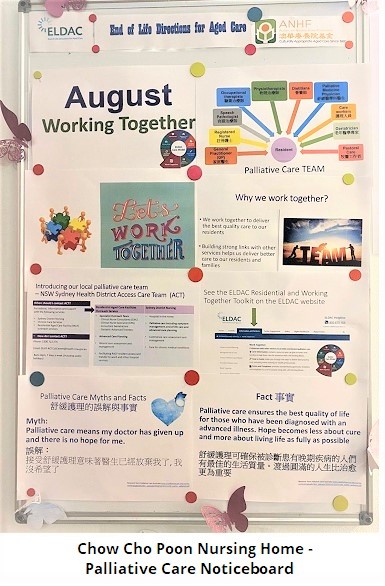Upskilling our aged care staff using the ELDAC Care Model
A blog post written by Yan Yau, Quality, Risk & Compliance Officer and Coordinator Lead for ANHF participating in the ELDAC Working Together Program, Australian Nursing Home Foundation (ANHF)
The benefits of participating in the ELDAC Working Together Program have been numerous for our facility, the Australian Nursing Home Foundation, in New South Wales. During the past year, the opportunity to use the ELDAC website and resources, including the Working Together toolkit, has helped us to upskill our staff, introduce new care pathways, and update our systems, teams, and processes.
We have built capacity within our organisation in a number of ways, including being more prepared to meet the requirements of the new Aged Care Quality Standards, particularly in the areas of providing palliative care, advance care planning, and responding to deterioration.
We have also developed and are continuing to grow our partnerships with other services to better improve the care we provide. While we recognise that ‘working together’ is not an automatic process, the time it takes to build trust and a strong working relationship has been well worth it for us. The decision to partner with a specialist palliative care service has been invaluable in supporting the care we provide to our residents.
Our facility is also working to upskill our staff by using the ELDAC Care Model (112kb pdf) as a framework for learning. The Care Model was developed by ELDAC in line with national policies and practices in palliative care to help aged care staff and services to consider and manage key issues in the last phase of life when a person progresses toward death. The Care Model has helped us to identify education and learning needs for our staff, but it can also be used to help your staff to determine:
- whether a person is approaching the end of their life
- how to plan and deliver care for a person
- how a person’s care needs might change over time
- what resources would be useful in providing care
- whether there are education or learning needs
The way that we’ve been building the Care Model into our practice has been through introducing a new domain from the Care Model to our staff each month, working with our new, dedicated Palliative Care Coordinator to research the domain and provide resources about that theme to add to our new noticeboard, which is dedicated to palliative care and a dvance care planning.
dvance care planning.
Each month we use the noticeboard to raise staff awareness about the Care Model domain being featured. We research a domain in the ELDAC Care Model and add resources about that topic to our noticeboard. We also arrange ‘toolbox talks’ that feature the domain and share tips, fun activities, and online learning modules with the staff at handover time.
Our toolbox talks are a great success as they feature a specific topic and are short, concise sessions with supporting materials given out to reinforce learning, including relating the lessons back to some real-life situations. As we are a multilingual site we have worked hard to translate our information so it can be read by staff in their first language, and because it can be hard to get exact translations, we work hard to use the right translation that captures the correct meaning.
We have been working consecutively through the domains of the Care Model, starting with the ‘Advance Care Planning’ domain. We’ve now explored more than half of the ELDAC Care Model domains and are spending a bit more time with each domain each month. When we started, the noticeboard probably looked quite formal and serious, but we’re incorporating some aspects of lightness and fun into the information we offer each month and are using the resources in the ELDAC toolkits for more information.

Yan Yau, Quality, Risk & Compliance Officer and Coordinator Lead for ANHF participating in the ELDAC Working Together Program, Australian Nursing Home Foundation (ANHF)
This blog is part of series of blogs commissioned by ELDAC to support aged care health professionals and care providers in providing end of life care. You can find more information on the ELDAC website. Additionally, the ELDAC Helpline is available 9am – 5pm, Monday – Friday (CST) on 1800 870 155 or email at ELDAC.Helpline@flinders.edu.au